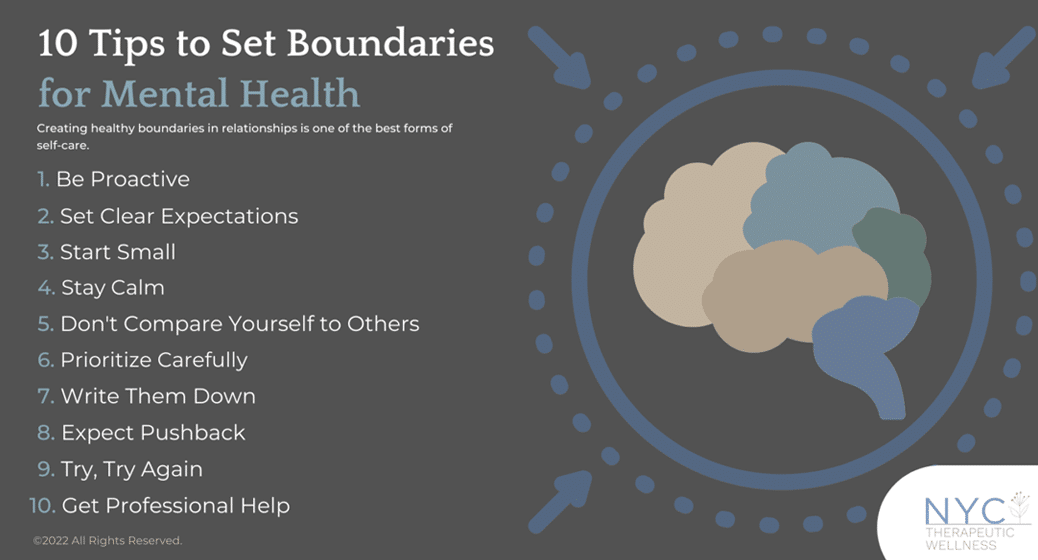1. Be Proactive About Setting Boundaries
First, you’ll want to have the right mindset from the beginning. Frame setting healthy boundaries as a proactive practice for your self-care, rather than a last resort to protect your mental health. Being intentional in this way will make you likelier to stick with boundary-setting as a habit – even when you experience setbacks.
2. Be Clear About Your Expectations
When starting out, some people may feel setting clear boundaries and asserting themselves is selfish or inconsiderate. To ease these emotions, they will use vague language to tiptoe around what they expect and want. However, this makes it easier for the boundary to be crossed – sometimes without you even realizing it! Part of self-care is advocating for yourself and your needs, despite whether they are inconvenient for others.
3. Start with Small Boundaries
It’s tempting to want to set ambitious boundaries, especially if you’ve been struggling to do so for a while. However, this can backfire to do too much at once. Even if you feel like you can take on more, start with small boundaries first. An example could include: “The hour after work is for me to be alone and recharge without attending to others’ needs.” If something like that sounds too difficult right now, it’s okay to set a smaller one. It’s more important to get used to having a boundary in place at all than it is to push your limits. Allow the little boundaries to fuel the motivation as well as the skill for you to set larger ones.
4. Don’t Get Defensive with Others
If a lack of boundaries has caused your emotional needs to be neglected for a long time, those strong feelings can sometimes emerge in an unhealthy way. It won’t be a good idea to push them down or eventually lash out when talking with another person. Therefore, it’s crucial to process those valid feelings and express them in a constructive manner. Then, you can work to remain calm yet firm in expressing your wants.
5. Not All Boundaries Are Created Equally
Depending on your personal tendencies, past experiences, and current circumstances, it will be harder to set some boundaries than others. For example, it may be easier to set a boundary with your boss about your workload than with a significant other about romance or intimacy. Keep in mind that this process is subjective and different for everyone. Try not to compare yourself with others who have an easier time setting boundaries in a particular area you may struggle with. As you learn to have healthy boundaries and foster better relationships, those areas will become less difficult to deal with.
6. Prioritize Urgent Boundaries First
When crossing lines significantly impacts your mental well-being, try to work on those areas first. You can’t rebuild your mental “home” while another room is currently on fire. However, we still recommend not biting off more than you can chew – especially if these areas require large boundaries. See if you can get additional help from friends, family, or professionals to navigate boundaries that are too extensive
to handle alone. If you’re trying to decide which boundaries to prioritize, consider the Pareto Principle, or 80/20 rule: What 20 percent of relationships are contributing to 80% of your stress?
Chances are, there are two or three areas making the most impact on your life, rather than an entire laundry list.
7. Have Rules (And Write Them Down)
Similar to being clear with others, have rules surrounding your boundaries and write them down. This is also to remind you of the boundaries you’ve set for yourself – a desire to compromise on them is likely to arise at some point in this process. Written boundaries remind you of what you wanted originally as well as the feelings that pushed you to create them.
Pro tip: Next to each boundary, write down three things:
- What is the alternative situation when the boundary isn’t there?
- Which emotions do you feel from that alternative situation? (no censoring here; respect the emotions as valid to you.)
- Start keeping score: Keep track of how many times you’ve maintained this boundary for yourself. You can even set goals and reward yourself when you reach a certain number of points – go you!
8. Expect Pushback Against Your Boundaries
In a perfect world, every relationship will respect your boundaries and lead to greater mental health and growth. But in reality, you will encounter people who continue to test your boundaries. It’s possible they will even blame or try to guilt trip you for asserting your needs. This is especially true if a person has become used to crossing your boundaries in a way that benefits them. Everyone makes mistakes, but if an individual constantly affects your mental health and refuses to respect your boundaries, it may be time to re-evaluate whether you want to continue that relationship.
9. Give Yourself Permission to Fail (And Try Again!)
Setting boundaries often isn’t easy. It takes practice and is a skill you develop over time. Because you’re learning a completely new behavior, part of the process is slipping up. Maybe you don’t say “no” the first few times around. That’s okay – don’t beat yourself up. It can be good to evaluate what went wrong to avoid making the same mistakes, but it’s more important to practice self-compassion and try again. Give yourself a high five for working on your self-care at all – regardless of a single outcome.
Also, remember you’re not alone…
10. Reach Out for Professional Help to Set Healthy Boundaries
It’s always great to get an outside perspective as you’re practicing this form of self-care. Talking with a trusted friend, mentor, or family member is a good place to start. You can also reach out to a mental health professional for help with setting healthy boundaries. Together, you will learn this skill faster, anticipate setbacks, and address any concerns or feelings you have throughout the process.
Keep Reading
Want more? Here are some other blog posts you might be interested in.







